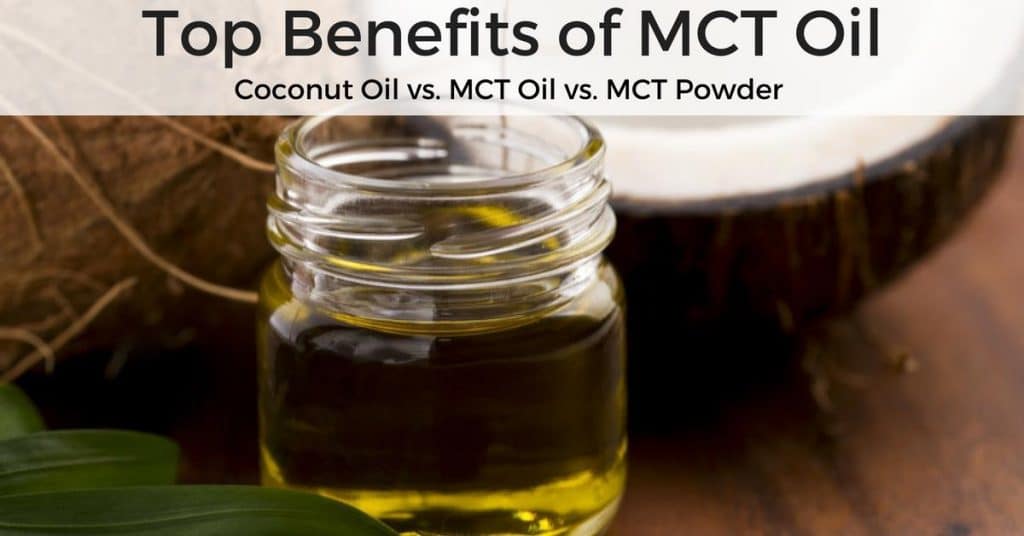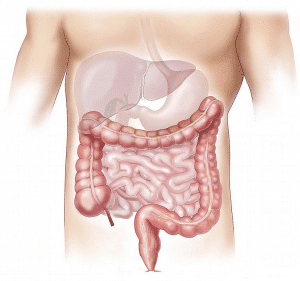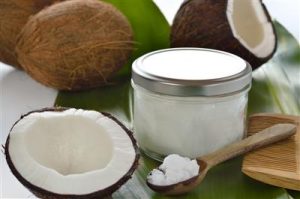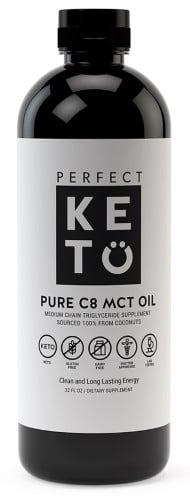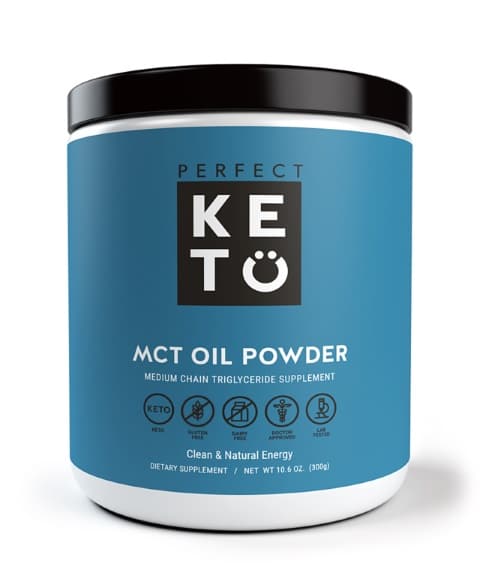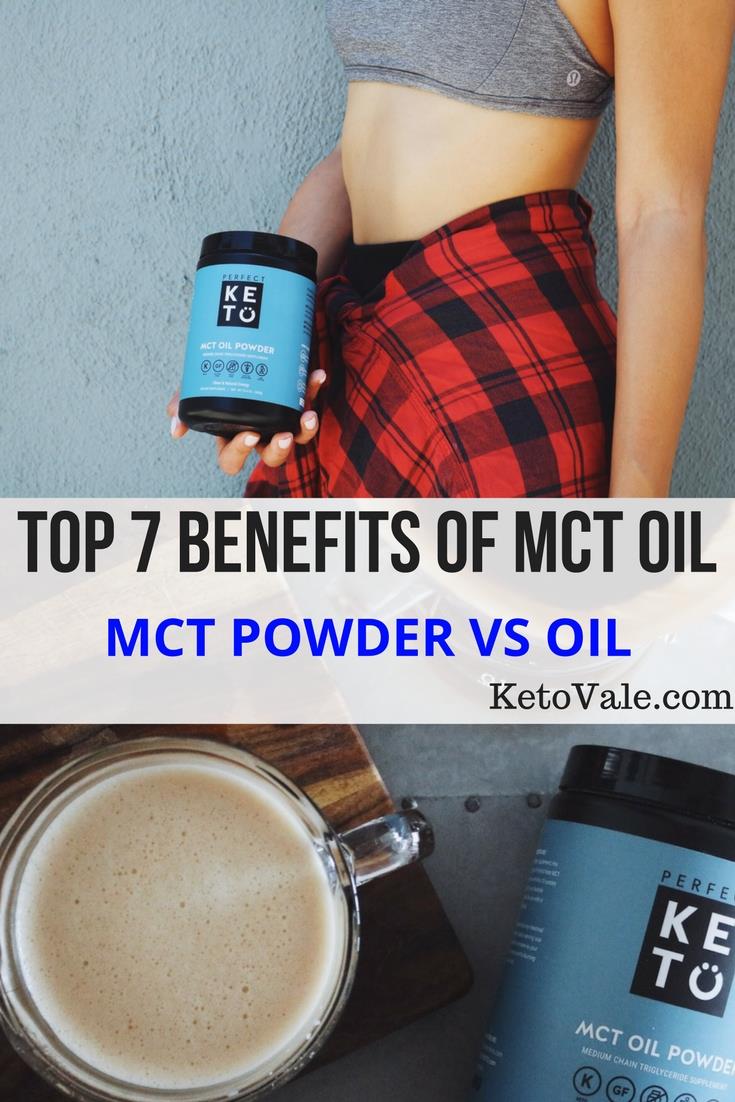When shopping for groceries or when Googling how to improve your diet, you may have come across MCT Oils. With such an enigmatic name and so many products in the market, you might be wondering what MCT Oil really is. Are they good or bad for your health? How do they measure up to coconut oil and other cooking oils?
In this article, we will help you answer those questions and more.
What is MCT Oil?
MCTs, or MCFAs, are Medium-Chain Fatty Acids (aka Medium Chain Triglycerides) which comprise saturated fatty acids with 6–10 carbons (1).
Although the chemical jargon may not mean much to the average consumer, there are two big classes of fatty acids: saturated and unsaturated.
The benefits of saturated fats, the class to which medium-chain fatty acids belong, are sent straight to the liver where they are immediately processed to be transformed into energy, and thus not stored as fat.
Unfortunately, these incredibly healthy fats seem to be missing from most of our diets, assuming you follow a “standard Western diet”, mainly due to the rise of the misconception that “all fats are bad fats”.
When it comes to natural sources, MCTs can be found mostly in coconut oil, grass-fed beef and its butter, cheese, and milk, and even in some full-fat yogurts.
By now you may be thinking, “But wait, coconut oil has MCTs?” In reality, coconut oil is one great source of MCTs, with around 62% to 65% of the fatty acid content in coconut oil being MCTs.
On the other hand, and although coconut oil is high on MCTs, there has been a lot of concentrated MCT oils introduced in the market, thus opening up an entirely new, healthy alternative to more traditional healthy fats.
The MCT oil is made from pure MCTs that are extracted from coconut oil or palm oil. You should choose the oil that is sourced from coconut because it contains the best quality MCTs.
Bottom line: MCT oil is not the same as coconut oil, it is a byproduct of it.
Types of MCTs
Unlike coconut oil which contains several different types of fatty acids, there are only four fatty acid strains in MCT oils.
- Caproic acid (C6)
The first fatty acid strain found in MCT oil is caproic acid or C6. Although it doesn’t taste very good and has been linked to an upset stomach, C6 converts into ketones very quickly, which is handy when it comes to keeping you in ketosis.
Research shows that caproic acid has antifibrinolytic properties to support heart health by promoting blood flow and preventing clots (2).
If you notice that your MCT oil has a weird taste or makes your throat burn, it’s probably because there wasn’t enough C6 removed during the distillation process.
- Caprylic Acid (C8)
Caprylic acid or C8 has been shown to contain antimicrobial abilities to boost the immune system and help you maintain a healthy digestive system (3).
Because of this, C8 tends to be the easiest form of MCT to digest. It also tends to convert to ketones better than C10 and is the fastest type of MCT to become metabolized by the brain.
C8 is a special type of MCT because it bypasses the liver during the digestive process and converts into ATP in as little as three easy steps.
ATP is the fuel your cells use as energy, so adding C8 to your diet can help you achieve the energy you need without the glucose rush. You might notice that C8 is more expensive than other forms of MCT.
- Capric Acid (C10)
Capric acid or C10 is the second shortest fatty acid chain found in MCT. C10 tends to be more affordable than C8 but is not as efficient at being converted into energy.
However, C10 doesn’t need to pass through the liver to be digested, so it’s still an excellent way to get quick energy when you need it.
Research shows that MCT oils usually contain either 100 percent C8, 100 percent C10 or a combination of both fatty acids. Just like C8, C10 includes anti-microbial properties to help kill harmful viruses and bacteria (4, 5).
- Lauric Acid (C12)
Unlike the other forms of MCT, lauric acid or C12 needs to go through the liver before being converted into ATP.
This means that it’s a slower form of energy and is better described as a long-chain fatty acid rather than an MCT.
Research shows that lauric acid may affect cholesterol levels more so than other forms of MCT, but it does contain antimicrobial properties.
However, the other types of MCT appear to be more effective at treating aggressive conditions such as candida, gonorrhea, and chlamydia (6).
As we start to have a clearer understanding of what MCT Oils are, let’s go ahead and discuss the top 7 benefits of this healthy fat, as we also share with you some of the scientific evidence behind them.
Health Benefits of Medium Chain Triglycerides
MCTs pack some pretty powerful health benefits. Among them are weight loss, improved brain function and reduced fatigue. MCTs also help boost the immune system and improve the digestive process, thanks to their antimicrobial properties.
Here’s why you should take MCT oil:
#1. Weight Control
As we stated before, MCTs are mostly used in the body as energy, which helps you decrease the amount of fatty tissue you have because it increases energy production.
This is because MCTs are not stored as fat like glucose and other fatty acids are (such as long-chain fatty acids).
Research shows that MCTs also help reduce the risk of obesity by stimulating weight loss and preventing long-term weight gain (7, 8).
Studies show that MCTs decrease your fat deposition, help you feel full for longer, and increase your long-term fat loss by heating up the body so that it burns more fat (9, 10)
Additionally, MCTs have been shown to enhance the thermogenesis process, or the process in which your body produces heat as a way to burn energy.
You might experience thermogenesis when you exercise or when it’s hot outside.
The idea is that when your inner body temperature rises, it causes you to burn more calories. This increase in heat also causes you to burn more fat and helps you control your weight.
Many studies have also shown that eating meals that contain MCTs increase your body’s ability to burn calories and fat by inducing the thermogenesis process (11, 12, 13, 14, 15, 16, 17, 18).
According to one study, MCTs can be used as part of a long-term weight loss plan. They are also more effective than the fats found in olive oil at helping you lose weight (19).
The study also found that people can use MCTs safely without fear of increased metabolic risk. Because foods that contain MCTs are filling and satisfying, you use them to help you lose weight by reducing your overall calorie intake.
Many people find that they don’t crave sweets anymore when they eat a high fat diet because they finally feel satisfied.
#2. Better Cognitive Function
MCT oil is often referred to as rocket fuel for your brain because it supplies a constant stream of energy, which means that you won’t experience highs and lows like you would with glucose.
Additionally, MCTs can be broken down in the liver to provide your brain with ketones, so you always have a backup plan when you need a boost.
Ketones are special because they are able to cross the blood-brain barrier, which means that they provide the brain with quick fuel.
Research shows that ketone bodies are an efficient fuel for the brain. They may also be able to improve memory and cognition in patients with dementia (20).
#3. Reduced Fatigue and Increased Energy
Because MCTs assist in the production of ketones, you can use MCT oil to help boost your energy levels and feel less fatigued. This is because, as explained above, ketones are used for immediate energy.
So whenever you’re feeling low on energy, just take some MCT oil and watch your mental and physical performance bounce back!
Additionally, MCTs are anti-inflammatory, which means that you can use them to help combat inflammatory conditions in the body that might be causing you to feel tired all the time (21, 22).
If you suffer from an autoimmune disease, then using MCT oil in place of inflammatory vegetable oils is crucial. Otherwise, you’ll be feeding the inflammation in your body that fuels your disease.
Even if you haven’t been diagnosed with an autoimmune condition, inflammation in your gut can still weigh you down and leave you feeling sluggish.
#4. Protection Against Metabolic Syndrome
Metabolic syndrome is a term used to describe a group of conditions, such as heart disease, diabetes, and obesity.
Research shows that MCTs help protect against metabolic syndrome to keep your heart healthy because they have anticoagulation and cholesterol-lowering abilities.
In other words, MCTs help reduce cholesterol in the liver and other tissues. They also promote blood flow to prevent blood clots and reduce the risk of a heart attack.
While the research surrounding MCTs cholesterol-lowering abilities was disputed for a long time, definitive proof came along back in 1986. One study found that MCTs that contain C8 and C10 reduce the risk of arteriosclerosis.
Researchers determined that rats who were fed MCT had lower body weight, smaller fat deposits, and excellent survival fats. The MCT feeding was also linked to the presence of fewer free radicals in the cells.
Finally, the theory that MCTs reduce atherosclerosis was confirmed by the Demographic Yearbook of the United Nations (1978) who reported that Sri Lanka had the lowest death rate from ischemic heart disease due to their diet that contains over 50 percent MCTs as their primary form of dietary fat (23).
Additionally, MCTs have a hypoglycemic effect in the body, which means that they reduce the amount of glucose in the blood to stabilize your levels and prevent crashes.
Research shows that people with type 2 diabetes who eat a diet high in MCTs can improve their insulin sensitivity (24, 25).
Even if you don’t have diabetes, you can use MCT oils to stabilize your blood sugar levels after eating a meal high in glucose.
#5. Digestive Support
You might not think about it, but your gut is an extremely important area of your body. It’s the place where nutrients are absorbed and distributed throughout your entire body.
Your gut is also the place where almost all of your immune cells live, so the health of your gut is not just important for digesting food. It’s an imperative part of keeping you healthy.
MCTs improve your digestive health by balancing the bacteria in your gut. In other words, they make sure that your microbiome, which is made of all sorts of bacteria, stays healthy.
Research shows that MCT has a positive effect on intestinal bacteria, which allows your gut to defend against threats, optimize your energy levels by enhancing the nutrient absorption process, and boosting your immunity to guard against diseases (26).
Because of its high fat content, MCT oil also helps you absorb vitamins, minerals, and antioxidants from your food, which allows you to utilize them better to keep the rest of your body healthy (27, 28).
For example, the fat-soluble vitamins A, D, E, and K require the presence of dietary fat to be absorbed. The minerals calcium, magnesium, lutein and phosphorus also need dietary fat for absorption.
Because they have anti-inflammatory properties, MCTs can be used to reduce inflammation in the gut that is responsible for digestive disorders and symptoms such as constipation, diarrhea, bloating, and pain.
When used in combination with a diet that’s low in refined sugars and carbohydrates, MCT oil can help reduce your digestive symptoms, keep you regular (which helps with energy and weight loss), and protect against potentially harmful bacteria and viruses.
#6. Antimicrobial Properties

Research shows that MCTs contain antibacterial, antiviral and antifungal properties that help keep us healthy.
Specifically, MCTs have been shown to kill pathogens that may cause throat infections, sinus infections and other strains that cause stomach viruses, ulcers and candida etc… (29, 30)
In fact, research shows that MCTs can be used to prevent many pathogenic viruses thanks to the lauric acid content in MCT.
One study found that fatty acids and monoglycerides whose chain lengths varied from 8 to 12 carbons (in other words, medium chain fatty acids) had strong antibacterial and antiviral properties when combined with milk than a formula that contained long-chain fatty acids.
Researchers found that medium-chain fatty acids that were added to milk inactivated several pathogens, such as herpes simplex virus type 1 (HSV-1), respiratory syncytial virus (RSV), Haemophilus influenzae and Group B streptococcus (31, 32).
If you’re on the ketogenic diet, then you probably should not add MCT oil to milk. But taking MCT oil is a perfectly acceptable way to fight bacteria and viruses without being kicked out of your fat-burning mode.
MCTs are especially effective at fighting pathogens when you stop eating refined sugar and carbohydrates that cause inflammation and disease.
#7. May Help With Seizure Control and Alzheimer’s Disease
Since the keto diet was created as a treatment for epilepsy because of the beneficial effects of ketone bodies on seizures. MCT Oil is also converted into ketones which also help with managing refractory epilepsy (33, 34, 35, 36, 37).
A scientific report showed that a 43-year-old man significantly reduced his seizure frequency from multiple daily seizures to only 1 seizure every four days just by adding 4 tbsp of MCT oil twice daily into his regular diet without experiencing any side effects. MCT supplementation is concluded to be a relatively cheap way to reduce seizures in some patients (38).
Oral supplementation of MCTs can improve the symptoms of Alzheimer’s and cognitive functioning in patients with Alzheimer’s disease and adults with memory disorders (39, 40, 41).
Do MCTs Trigger Ketosis?
Yes! This is a super bonus benefit for ketogenic diet followers! It’s one of the big reasons why keto dieters add MCTs into their diet.
Many studies show that in addition to stimulating the fat burning process in your body, MCTs also help promote and keep you stay in ketosis, which we already know is a fat burning mega process (42, 43, 44, 45, 46)!
MCTs help you produce ketones, which is a better fuel source than glucose as it isn’t stored in your fatty tissues and is used as immediate energy, so there is less energy for you to store as fat.
Overall, the long-term use of MCT as part of a ketogenic diet is a safe and effective way to lose weight and prevent obesity.
In short, MCT Oil may help you lose weight by:
- Reducing appetite and increasing feelings of fullness
- Causing fat burning and fat loss
- Burning more calories
- Supporting the keto diet because MCTs induce ketosis and produce ketones.
MCT Oil Side Effects
Because MCT oil is easy on the digestive tract, most people find that it’s well tolerated with few side effects.
MCT oil is also tasteless, which means that it isn’t offensive to take. Some reports online have noted that MCT oil may cause an upset stomach, diarrhea, vomiting and nausea, especially if you take too much of it.
You can avoid any side effects by starting slow. Take one teaspoon a day of MCT oil and see how it works for you. Once you know that it’s well tolerated, you can increase your daily intake.
If you cannot tolerate MCT oil, maybe it’s time to switch to the powder form of MCTs as many people reported that the powdered MCT is easier on their digestive systems.
MCT Oil vs MCT Powder
Nutritionally, MCT oil and MCT powder are very much the same.
This is because MCT powder is made from MCT oil, but then it undergoes a process called spray drying that turns it into a powder.
In other words, MCT powder is sprayed into a tiny powder that is designed to be its carrier shell. The entire process converts the oil into a solid powder form.
The process of spray drying is also used to make powdered milk, vitamins, and even coffee. It works by binding the MCT oil to a carrier, which is usually a fiber. Then the oil is put through an atomizer where hot air is put into a chamber to dry out the oil and turn it into a powder.
Ideally, there shouldn’t be anything added to the powder once it’s ready, but some manufacturers will add things to make it taste better or to extend its shelf life.
The best MCT powder should contain MCTs and gut-friendly acacia fiber as a carrier. We’ll include our #1 MCT powder recommendation below!
Both forms of MCT offer a nutritional punch and clean energy, but each has their drawbacks.
For example, the powder version of MCT tends to be easier to take with other supplements, easier to digest, and easier to incorporate into food. But MCT oil has been researched more extensively and comes with a proven list of benefits.
Here is a list of some of the pros and cons of oil and powder form:
Pros of MCT Oil:
- Solid research: MCT oil has been researched extensively and there are several studies to back up its claims.
- Specifically, research shows that MCT oil can be converted into ketones that are readily available as energy. It has also been shown to help aid with weight loss, prevent diabetes, improve cognitive performance, help improve physical performance and prevent heart disease by promoting blood flow and reducing blood clots.
- More efficient manufacturing process: MCT oil doesn’t require a carrier like MCT powder does. This means that it is less likely to contain fillers or additives.
- Good for cooking: MCT oil is durable and can be used during cooking without worrying that it will lose its nutritional profile. Use it in salads, pasta, and dressings that require low-heat cooking.
Cons of MCT oil:
- Hard to travel with: MCT oil is hard to travel with since it’s an oil and things can get messy. You risk spilling the oil in your suitcase or other baggage.
- May cause digestive issues: although the side effects for MCT oil are not extensive, it’s possible that you may experience digestive discomfort if you take too much of it.
- Hard to mix in with liquids: because it’s an oil, it’s harder to mix in MCT oil with liquids without making your liquid appear too oily.
- Must be taken on its own: most supplements come in powder form, so that means that you’ll have to take MCT oil on its own and you won’t be able to combine it with other supplements easily.
Pros of MCT Powder:
- Convenient: MCT powder is easier to travel with than MCT oil because it’s not as messy. You can pack it in bags with a plastic bag without worrying too much about it spilling.
- Can be combined with other supplements: powders are easier than oils to combine with other supplements, such as ketones or collagen powder. This means that you can save time and you won’t have to worry about forgetting to take your MCT oil.
- Digested easier: Some people claim that the powder form of MCT is easier to digest, which means that you have the potential for more energy and ketone levels as well as a decreased risk for digestive upset. One study found that MCT powder has better nutrient digestibility (47).
- Easier to cook with: MCT powder is easier to add to baked goods than the oil version. It’s also tasteless (as long as there are no added fillers) so you won’t have to worry about it changing the flavor of your favorite energy bars.
- Has a creamy texture: MCT powder has a creamier texture that makes it easier to add to coffee as a coffee creamer or other beverages without making it oily.
Cons of MCT Powder:
- May include additives: depending on the manufacturers, some MCT powders are processed with additives, sweeteners and other fillers, which can spike your blood sugar response and kick you out of ketosis. Because of this, you might have to look harder or pay more for a powder that doesn’t include additives.
- Needs a carrier: unlike MCT oil, MCT powder requires a carrier fiber, which gives manufacturers the opportunity to use a cheap one to keep the cost of their product down. Cheaper carriers also affect the ratio between MCTs and non-MCTs.
- Not well researched: although the benefits of MCT are well established, there is not a lot of research on MCT powder exclusively. This is mostly because MCT powder is a relatively new product, but it still makes a more compelling case for MCT oil.
How To Use MCT Oil
There are several ways to incorporate MCT oil into your daily routine. Some people like to take MCT oil in the form of a soft gel, which is easy to swallow and gets the job done right away.
Using a soft gel means that you don’t have to worry about spilling the oil from a bottle if you take it by the spoonful. It’s also easier to travel with than a bottle of oil. Most soft gels are odorless and mess-free. You can put a bottle in your desk at work and one in your gym bag, so you have access to them anytime you need a boost.
You can also add MCT oil to recipes or even your morning coffee. As we mentioned before, it’s odorless and tasteless, so throwing some in baked goods or even a smoothie means that you won’t have to worry about changing the taste.
Keep in mind that adding oil to a beverage might make it oily, so only do this if you are using a little bit. You can also add MCT oil to salad dressing, pasta, and stir-frys.
For larger amounts, you might want to stick with a soft gel. If all else fails, you can use MCT powder and add it to your coffee or other foods. Powders tend to dissolve better, but remember that you’ll need to find one without additives.
So How Do MCT Oils Measure Up to Coconut Oil?
Although there has been a lot of speculation between the benefits of these two oils, the difference between MCT oil and coconut oil lies solely on the fact that MCT oil is more concentrated and contains different proportions of MCTs.
In other words, MCT oil is a concentrated solution of MCTs whereas coconut oil is not.
There are 4 different types of MCTs which vary based on the number of carbons, thus ranging from 6 to 12 carbons long. The MCTs in coconut oil are made up of about 50% of lauric acid, one kind of MCTs.
MCT Oils on the other hand, usually have all four types of MCTs that can be difficult to get from other foods. This is one of the reasons why some people prefer MCT oils over coconut oil.
Some producers of MCT Oil might claim that their product contains more concentrated and diverse MCTs than real coconut oil does, it also means the process required to produce these oils is also more refined and less natural than the processes required to obtain coconut oil.
Although there is still no bullet proof study that can finally settle which oil offers more health benefits, the bottom line is simple: buy high-quality MCT Oil or coconut oil, according to your personal use and preference.
Our Product Recommendation
While there are so many MCT oil brands and types available to choose from, we choose Perfect Keto because they are completely clean and have ZERO additives or fillers.
Unlike other MCT products, Perfect Keto’s MCTs is sourced 100% from pure coconuts.
Other MCT products might add fillers such as sunflower lecithin, corn fiber, maltodextrin and sodium caseinate to cut down the costs. These fillers and additives can cause a glucose spike (taking you out of ketosis) and are always unnatural. Perfect Keto products are doctor-developed and 100% clean and high quality.
You can use MCT oils in your bulletproof coffee, smoothie, baking or add it to your salad dressing.
Here are the best MCT Oil and Powder you can try today:
[one_half_first]
[thrive_link color=’red’ link=’https://www.ketovale.com/mct6′ target=’_blank’ rel=”nofollow noopener” size=’medium’ align=’aligncenter’]Check Best Price![/thrive_link]
[/one_half_first][one_half_last]
[thrive_link color=’red’ link=’https://www.ketovale.com/ykab’ target=’_blank’ rel=”nofollow noopener” size=’medium’ align=’aligncenter’]Check Best Price![/thrive_link]
[/one_half_last]
Conclusion
Whether or not you’re on the ketogenic diet, you can benefit from using MCT oil. Research shows that it can help you lose weight, improve your insulin resistance, fuel your brain quickly, and even promote digestive and immune health.
MCT oil is even more effective if you use it in conjunction with a ketogenic diet because it helps produce ketones. You can add MCT oil to your foods or hot drinks as it has a high smoke point and won’t break down nutritionally.
Although side effects are rare, you might want to start slow as some people report having digestive issues when they first start taking it.
Feel free to share this article by pining this photo to your Pinterest board to read later.
